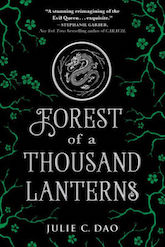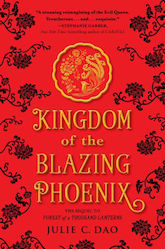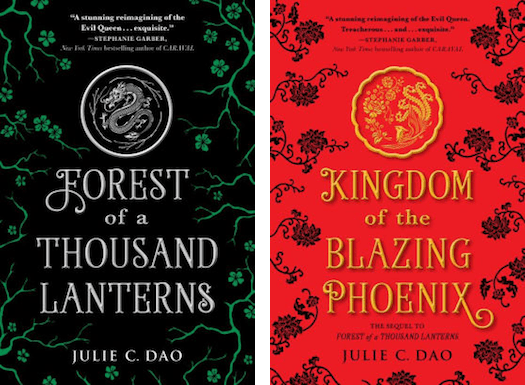In Forest of a Thousand Lanterns, the beautiful but poor Xifeng has been raised her entire life to believe she’s destined for greatness as the Empress of Feng Lu. For a woman not born into nobility, that dream seems nearly beyond reach. When a chance arises to go to the capital, Xifeng seizes it, armed with her beauty and dark magic learned from her aunt. As she learns to navigate the pit of vipers that is the imperial court, Xifeng is faced with choices that can lead to her destiny—if she’s willing to pay the price.
To talk about book two of this duology, I’ll be discussing the ending of Forest of a Thousand Lanterns, so stop here if you’re looking to avoid spoilers!
In the imperial court, Xifeng befriends Empress Lihua to get closer to Emperor Jun, later seducing the Emperor as Lihua dies slowly of poison while carrying a child. The child of Lihua and Jun is Lihua’s long-desired daughter, whom she names Jade. When Xifeng becomes Empress after Lihua’s death, she banishes Jade to live away from the palace, planning to supplant Jade—Jun’s only heir at this point—with her own sons, thereby ending Lihua’s line entirely.
In Kingdom of the Blazing Phoenix, 18-year-old Jade, who has lived in a monastery nearly all her life, is summoned back to the palace. She’s told the Emperor and Empress want her in their lives once more—but Jade doesn’t believe a word of it. After all, her stepmother’s the one who exiled her to a monastery in the first place—and her father was the one who let the exile happen. But upon her return to the capital, Jade discovers that it’s not the Emperor, but Empress Xifeng who truly rules… and it soon becomes clear Xifeng wants to destroy her.
Buy the Book


Forest of a Thousand Lanterns
Julie C. Dao’s Rise of the Empress duology is an East Asian-inspired fantasy retelling of Snow White. Working within the framework of this familiar story—one originally focused on the perils of vanity and the virtues of devoted housework—Dao turns the old tale into something new by instead exploring destiny, personal choices, and responsibility. Destiny sets the stage for both novels: Xifeng is obsessed with the destiny her aunt Guma foretold in the cards, while Jade is aware that she’s destined to become Empress because of her birth and, despite her reluctance, chooses to fulfill her responsibilities. Both Xifeng and Jade face decisions at crossroads that can lead towards or away from the destinies they’re told of so repeatedly, and both end up on the path to fulfill them.
These destinies define who they will become: Xifeng evolves into Snow White’s Evil Queen, even as Jade chooses to fulfill her role as the eponymous princess and heroine of good. In this duology, though, it’s not a person’s decisions that determine whether they’re good or evil, but the values that guide those decisions in the first place.
Much of Forest of a Thousand Lanterns paints Xifeng as a sympathetic, even pitiable character. Despite—and in some ways because of—her remarkable beauty, Xifeng’s life is filled with people she can’t trust: women gossip jealously about her behind her back, and men want to own her because of her looks. Even Wei, the boy she purports to love, seems to want to possess and restrict her, which disturbs her even as she tries to define how she feels for him. Xifeng struggles to navigate the court upon her arrival, surrounded by women she believes are unfriendly, even vicious, out of jealousy of her beauty. In the end, she chooses to pursue the Emperor—because if she must be possessed, why should it not be by the most powerful man in Feng Lu instead of a poor soldier?
The ending of Forest of a Thousand Lanterns sees Xifeng ascending to the throne, supplanting the former Empress and gaining the power she believes she’s always been destined to have. Dao hints, though, at something else: Xifeng’s unreliability as the lens for narration.
Before making her his Empress, Emperor Jun brings Xifeng to a meeting of his council to discuss trade, levies, and taxes. Having worked with silk before coming to the palace, Xifeng at first advocates for the people of Feng Lu, who she insists know silk the best—but she then recommends raising both the export levies and the taxes on the workers who make the silk. This would force workers to work longer hours producing more silk, only to earn the same pittance they had been making before. One official remarks upon her lack of compassion for the peasants, at which point Xifeng tells him, “Warmth has never filled the coffers, Minister. Royal or otherwise.” It’s a defining moment, illustrating how Xifeng really views power, as it’s the first time we see her make a power-related choice outside the context of the dark magic she’s involved in. For her, power means wealth, the subservient loyalty of her subjects, and the means to humiliate or otherwise destroy her enemies, or even people who vaguely annoy her.
By the time readers see Xifeng again in Kingdom of the Blazing Phoenix, the icy cruelty towards the people of the empire that was only briefly explored in the previous book has blossomed. What Jade witnesses as she crosses the continent on her way to the capital is a devastating picture of poverty. Jade, the princess born to wealth and power, has lived almost her entire life in a monastery, where she completed daily chores, lived side-by-side with the monks, and formed one key perspective that, in the eyes of the narration, defines her goodness:
I am no better than anyone else. I was just born to the right parents.
Buy the Book


Kingdom of the Blazing Phoenix
Jade’s attitude is a far cry from Guma’s constant words to Xifeng in Forest of the Thousand Lanterns, telling her she was born to be better than those around her. This attitude also informs Jade’s relationships with the people she encounters: she treats her nursemaid, Amah, as her own grandmother rather than a servant; she treats Amah’s biological granddaughter, Wren, as her own sister; she’s uncomfortable being served and sends away the maids Xifeng sends to serve (and spy on) her. In some ways, Jade’s belief that she’s just an ordinary person born into extraordinary circumstances is the thing that protects her most: it makes her beloved of the people of Feng Lu, who strain under the weight of Xifeng’s oppressive policies, and it makes her beloved of her companions, whose loyalty Jade returns in equal measure.
The biggest difference between Xifeng and Jade lies within the circumstances of their birth, though not in the way laid out directly on the page: while Jade was a daughter long-awaited and much beloved by her mother, the former Empress Lihua, Xifeng was raised by her aunt Guma, who beat her and abused her verbally. As mentioned before, Xifeng assumes other women are hostile because of her beauty, but as multiple characters point out in Kingdom of the Blazing Phoenix, her suspicions towards other women are in several ways motivated by the belief instilled by Guma that other women are her natural enemies. Jade’s love for and trust in other women stems from the love of the women in her own life: her mother Lihua, who wanted desperately to bear a daughter, and her nursemaid Amah, who raised her as if she were her own blood.
Though the Rise of the Empress duology is about Xifeng and Jade, the ghosts of Guma and Lihua are ever-present, influencing the protagonists and the story even when they’re not on the page. At the end of the story, I’m left wrestling with questions. In the end, do our decisions ever really belong to us? How much of the person we’ve “decided” to be is a person formed by the people who’ve influenced us—and the people who’ve loved us?
Forest of a Thousand Lanterns and Kingdom of the Blazing Phoenix are, at their core, a story about the importance of the mother figures in our lives to the person we become: our values define the who we are, and it’s the people who raise us who teach us those values.
Forest of a Thousand Lanterns and Kingdom of the Blazing Phoenix are available from Philomel Books.
Feliza Casano writes about science fiction, manga, and other geeky media around the internet. She currently lives in Philadelphia, where she moderates two book clubs and lines her walls with stacks of books. Visit her online or follow her on Twitter @FelizaCasano.










